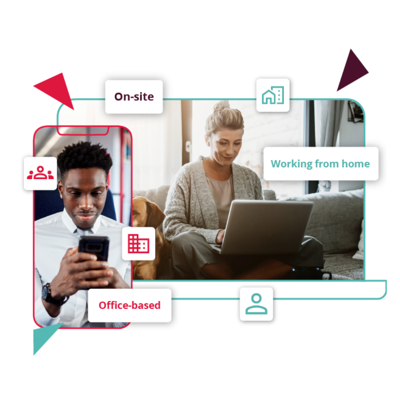A hybrid working nation: new research highlights how it’s working out
Before Covid-19 derailed our working, and personal lives, just 12% of working adults said they’d worked from home on a regular basis. Then remote working became the norm for many office-based employees, on and off, for the best part of 18 months. Now the proportion of adults working from home at least some of the week has more than tripled.
All this has had a profound effect on workplace life and culture – both positive and negative. Some employees say their productivity and work-life balance have improved, yet others report feeling disconnected from their colleagues and company life.

Hybrid working, if not managed well by an organisation, can also be a source of stress and division across the workforce because of the way people in different age groups, income brackets and job roles experience it.
This was clear from a study into hybrid working that we commissioned from the University of Nottingham. While just under 59% said they were generally happy, a concerning 41% of those surveyed reported feeling depressed.
Introducing the study
Researchers at Nottingham University Business School gathered responses from more than 500 employees, most of whom were hybrid or remote working, to understand how their current working conditions are impacting their wellbeing, engagement, productivity and performance. They also interviewed a sample of respondents, whose comments provided deeper insights into the challenges and opportunities brought about by this new way of working.
The findings and expert commentary are contained in this report – which highlights some of the wider trends and will hopefully spark questions and ideas about how to make hybrid working models a success in your organisation.
Postgraduate researchers Fiona Frost and Miguel Munoz led the research project and their findings form the basis of this report, alongside insights from Health and Happiness Researcher Dr Phil Parker, PhD, Claire Scott, Chief Employee Success Officer at the Access Group, and Charles Butterworth, Managing Director of Access People.

Technology supporting culture
A healthy workplace culture, built on trust and accountability, is at the centre of any successful organisation. Wellbeing, engagement and performance are all clear indicators of how good (or bad) a culture is – and technology plays a critical role in improving all three. The study showed the impact an electronic monitoring system can have on employees, who see it as a sign that their managers don’t trust them. Yet the right system empowers people – with a technology solution like Access Workspace employees can access self-service tools that allow them to access information, book leave, submit expenses or, where applicable, choose and swap shifts. When managers trust employees to manage their schedules, wellbeing and productivity naturally improve, without the need for constant monitoring.
There isn’t a one-size-fits-all approach to people strategies, and new challenges are emerging all the time (think of how a home care worker might be impacted by the recent fuel hikes, or someone working in hospitality who has no option to work anywhere other than in a restaurant).
It’s easy to make assumptions about how people feel about hybrid working – however, it’s only when you see a wide range of perspectives that you can create policies that work for everyone in an organisation, irrespective of their role, location and ways of working.


 AU & NZ
AU & NZ
 SG
SG
 MY
MY
 US
US
 IE
IE





